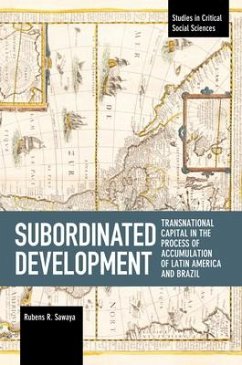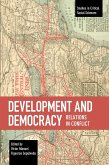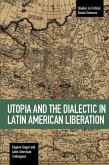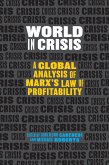Rubens R. Sawaya
Subordinated Development
Transnational Capital in the Process of Accumulation of Latin America and Brazil
Rubens R. Sawaya
Subordinated Development
Transnational Capital in the Process of Accumulation of Latin America and Brazil
- Broschiertes Buch
- Merkliste
- Auf die Merkliste
- Bewerten Bewerten
- Teilen
- Produkt teilen
- Produkterinnerung
- Produkterinnerung
Focusing on the processes of accumulation, concentration, and centralisation of capital, Rubens Sawaya traces the transnationalisation of capital and its impact on Latin America and Brazil
Andere Kunden interessierten sich auch für
![Development and Democracy: Relations in Conflict Development and Democracy: Relations in Conflict]() Victor Manuel Figuer SepulvedaDevelopment and Democracy: Relations in Conflict32,99 €
Victor Manuel Figuer SepulvedaDevelopment and Democracy: Relations in Conflict32,99 €![Utopia and the Dialectic in Latin American Liberation Utopia and the Dialectic in Latin American Liberation]() Eugene GogolUtopia and the Dialectic in Latin American Liberation43,99 €
Eugene GogolUtopia and the Dialectic in Latin American Liberation43,99 €![Uncommon Grounds Uncommon Grounds]() Mark PendergrastUncommon Grounds29,99 €
Mark PendergrastUncommon Grounds29,99 €![World in Crisis World in Crisis]() World in Crisis19,99 €
World in Crisis19,99 €![Gold, Oil and Avocados: A Recent History of Latin America in Sixteen Commodities Gold, Oil and Avocados: A Recent History of Latin America in Sixteen Commodities]() Andy RobinsonGold, Oil and Avocados: A Recent History of Latin America in Sixteen Commodities23,99 €
Andy RobinsonGold, Oil and Avocados: A Recent History of Latin America in Sixteen Commodities23,99 €![The Super Age The Super Age]() Bradley SchurmanThe Super Age23,99 €
Bradley SchurmanThe Super Age23,99 €![The Hidden Globe The Hidden Globe]() Atossa Araxia AbrahamianThe Hidden Globe17,99 €
Atossa Araxia AbrahamianThe Hidden Globe17,99 €-
-
-
Focusing on the processes of accumulation, concentration, and centralisation of capital, Rubens Sawaya traces the transnationalisation of capital and its impact on Latin America and Brazil
Hinweis: Dieser Artikel kann nur an eine deutsche Lieferadresse ausgeliefert werden.
Hinweis: Dieser Artikel kann nur an eine deutsche Lieferadresse ausgeliefert werden.
Produktdetails
- Produktdetails
- Studies in Critical Social Sciences
- Verlag: Haymarket Books
- Seitenzahl: 228
- Erscheinungstermin: 15. Oktober 2019
- Englisch
- Abmessung: 226mm x 155mm x 15mm
- Gewicht: 338g
- ISBN-13: 9781642590661
- ISBN-10: 1642590665
- Artikelnr.: 55192113
- Herstellerkennzeichnung
- Libri GmbH
- Europaallee 1
- 36244 Bad Hersfeld
- gpsr@libri.de
- Studies in Critical Social Sciences
- Verlag: Haymarket Books
- Seitenzahl: 228
- Erscheinungstermin: 15. Oktober 2019
- Englisch
- Abmessung: 226mm x 155mm x 15mm
- Gewicht: 338g
- ISBN-13: 9781642590661
- ISBN-10: 1642590665
- Artikelnr.: 55192113
- Herstellerkennzeichnung
- Libri GmbH
- Europaallee 1
- 36244 Bad Hersfeld
- gpsr@libri.de
Rubens R. Sawaya, professor in the Department of Economics and coordinator of the Postgraduate Program in Political Economy at the Pontifical Catholic University of São Paulo (PUCSP), Brazil, has an MA in economics and a Ph.D. in political science from that same university.
Table of Contents
Introduction
1 Capital Accumulation, Concentration and Centralisation
1.1Introduction
1.2The Commodity as a Process Cell
1.3The Process of Capital Accumulation
1.4Productivity and the Concentration of Capital
1.5Realisation of Value, the Condition for Accumulation, Concentration and
Centralisation
1.6The Centralisation of Capital
2 Capital Accumulation, Transnational Capital and the Exclusion of the
Periphery
2.1Introduction
2.2The Question of Space for Accumulation
2.3Globalisation: Accumulation and Concentration
2.4Concentration
2.5Accumulation and Concentration: The Question of Political-Geographic
Space
2.6Internationalisation as the Realisation of Value
2.7Realisation, Internationalisation and the Political-Geographic Space
2.8Capital Centralisation
2.9The Centralisation of Space: The Exclusion of the Periphery
3 The Inclusion of the Periphery in the Process of Global Accumulation
3.1Introduction
3.2The Logic of Development through Import Substitution
3.3State Participation
3.4The Participation of Transnational Capital
3.5Transnational Capital as Dynamic Centre
3.6Materialisation of the New Dependency
3.7The Development of Submission to the Movement of Globalised Capital
4 Brazil in Capital's Globalisation
4.1Introduction
4.2Vargas - The Institutional Apparatus for Development
4.3National Associated Development - The Targets Plan (Plano de Metas)
4.4The Attempt to Recreate a National Policy and the Resumption of
Associated Development - 1960-64
4.5The Strengthening of Transnational Capital - The "Economic Miracle"
4.6Brazil as a Power - ii pnd
4.7Scrapping the National State - The 1980s
4.8The 1990s - Growing Subordination to Globalised Capital
4.9The Lula Government facing the Power Structure: Conciliation or
Confrontation?
5 The possibility of a Forced Disconnection
5.1Accumulation, Subordination and Disconnection
5.2The Question of Centralisation
5.3The Centralisation of the 1980s and 1990s
5.4Centralisation between Countries
5.5Centralisation and Financial Flows
5.6Centralisation and the Periphery
5.7The forced Disconnection
5.8Final Considerations
Bibliography
Index
Introduction
1 Capital Accumulation, Concentration and Centralisation
1.1Introduction
1.2The Commodity as a Process Cell
1.3The Process of Capital Accumulation
1.4Productivity and the Concentration of Capital
1.5Realisation of Value, the Condition for Accumulation, Concentration and
Centralisation
1.6The Centralisation of Capital
2 Capital Accumulation, Transnational Capital and the Exclusion of the
Periphery
2.1Introduction
2.2The Question of Space for Accumulation
2.3Globalisation: Accumulation and Concentration
2.4Concentration
2.5Accumulation and Concentration: The Question of Political-Geographic
Space
2.6Internationalisation as the Realisation of Value
2.7Realisation, Internationalisation and the Political-Geographic Space
2.8Capital Centralisation
2.9The Centralisation of Space: The Exclusion of the Periphery
3 The Inclusion of the Periphery in the Process of Global Accumulation
3.1Introduction
3.2The Logic of Development through Import Substitution
3.3State Participation
3.4The Participation of Transnational Capital
3.5Transnational Capital as Dynamic Centre
3.6Materialisation of the New Dependency
3.7The Development of Submission to the Movement of Globalised Capital
4 Brazil in Capital's Globalisation
4.1Introduction
4.2Vargas - The Institutional Apparatus for Development
4.3National Associated Development - The Targets Plan (Plano de Metas)
4.4The Attempt to Recreate a National Policy and the Resumption of
Associated Development - 1960-64
4.5The Strengthening of Transnational Capital - The "Economic Miracle"
4.6Brazil as a Power - ii pnd
4.7Scrapping the National State - The 1980s
4.8The 1990s - Growing Subordination to Globalised Capital
4.9The Lula Government facing the Power Structure: Conciliation or
Confrontation?
5 The possibility of a Forced Disconnection
5.1Accumulation, Subordination and Disconnection
5.2The Question of Centralisation
5.3The Centralisation of the 1980s and 1990s
5.4Centralisation between Countries
5.5Centralisation and Financial Flows
5.6Centralisation and the Periphery
5.7The forced Disconnection
5.8Final Considerations
Bibliography
Index
Table of Contents
Introduction
1 Capital Accumulation, Concentration and Centralisation
1.1Introduction
1.2The Commodity as a Process Cell
1.3The Process of Capital Accumulation
1.4Productivity and the Concentration of Capital
1.5Realisation of Value, the Condition for Accumulation, Concentration and
Centralisation
1.6The Centralisation of Capital
2 Capital Accumulation, Transnational Capital and the Exclusion of the
Periphery
2.1Introduction
2.2The Question of Space for Accumulation
2.3Globalisation: Accumulation and Concentration
2.4Concentration
2.5Accumulation and Concentration: The Question of Political-Geographic
Space
2.6Internationalisation as the Realisation of Value
2.7Realisation, Internationalisation and the Political-Geographic Space
2.8Capital Centralisation
2.9The Centralisation of Space: The Exclusion of the Periphery
3 The Inclusion of the Periphery in the Process of Global Accumulation
3.1Introduction
3.2The Logic of Development through Import Substitution
3.3State Participation
3.4The Participation of Transnational Capital
3.5Transnational Capital as Dynamic Centre
3.6Materialisation of the New Dependency
3.7The Development of Submission to the Movement of Globalised Capital
4 Brazil in Capital's Globalisation
4.1Introduction
4.2Vargas - The Institutional Apparatus for Development
4.3National Associated Development - The Targets Plan (Plano de Metas)
4.4The Attempt to Recreate a National Policy and the Resumption of
Associated Development - 1960-64
4.5The Strengthening of Transnational Capital - The "Economic Miracle"
4.6Brazil as a Power - ii pnd
4.7Scrapping the National State - The 1980s
4.8The 1990s - Growing Subordination to Globalised Capital
4.9The Lula Government facing the Power Structure: Conciliation or
Confrontation?
5 The possibility of a Forced Disconnection
5.1Accumulation, Subordination and Disconnection
5.2The Question of Centralisation
5.3The Centralisation of the 1980s and 1990s
5.4Centralisation between Countries
5.5Centralisation and Financial Flows
5.6Centralisation and the Periphery
5.7The forced Disconnection
5.8Final Considerations
Bibliography
Index
Introduction
1 Capital Accumulation, Concentration and Centralisation
1.1Introduction
1.2The Commodity as a Process Cell
1.3The Process of Capital Accumulation
1.4Productivity and the Concentration of Capital
1.5Realisation of Value, the Condition for Accumulation, Concentration and
Centralisation
1.6The Centralisation of Capital
2 Capital Accumulation, Transnational Capital and the Exclusion of the
Periphery
2.1Introduction
2.2The Question of Space for Accumulation
2.3Globalisation: Accumulation and Concentration
2.4Concentration
2.5Accumulation and Concentration: The Question of Political-Geographic
Space
2.6Internationalisation as the Realisation of Value
2.7Realisation, Internationalisation and the Political-Geographic Space
2.8Capital Centralisation
2.9The Centralisation of Space: The Exclusion of the Periphery
3 The Inclusion of the Periphery in the Process of Global Accumulation
3.1Introduction
3.2The Logic of Development through Import Substitution
3.3State Participation
3.4The Participation of Transnational Capital
3.5Transnational Capital as Dynamic Centre
3.6Materialisation of the New Dependency
3.7The Development of Submission to the Movement of Globalised Capital
4 Brazil in Capital's Globalisation
4.1Introduction
4.2Vargas - The Institutional Apparatus for Development
4.3National Associated Development - The Targets Plan (Plano de Metas)
4.4The Attempt to Recreate a National Policy and the Resumption of
Associated Development - 1960-64
4.5The Strengthening of Transnational Capital - The "Economic Miracle"
4.6Brazil as a Power - ii pnd
4.7Scrapping the National State - The 1980s
4.8The 1990s - Growing Subordination to Globalised Capital
4.9The Lula Government facing the Power Structure: Conciliation or
Confrontation?
5 The possibility of a Forced Disconnection
5.1Accumulation, Subordination and Disconnection
5.2The Question of Centralisation
5.3The Centralisation of the 1980s and 1990s
5.4Centralisation between Countries
5.5Centralisation and Financial Flows
5.6Centralisation and the Periphery
5.7The forced Disconnection
5.8Final Considerations
Bibliography
Index








